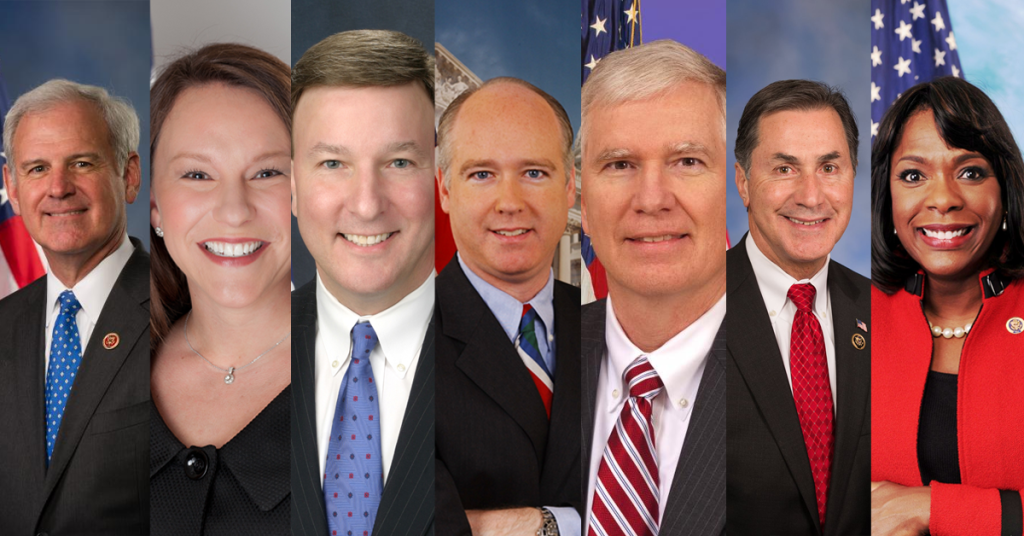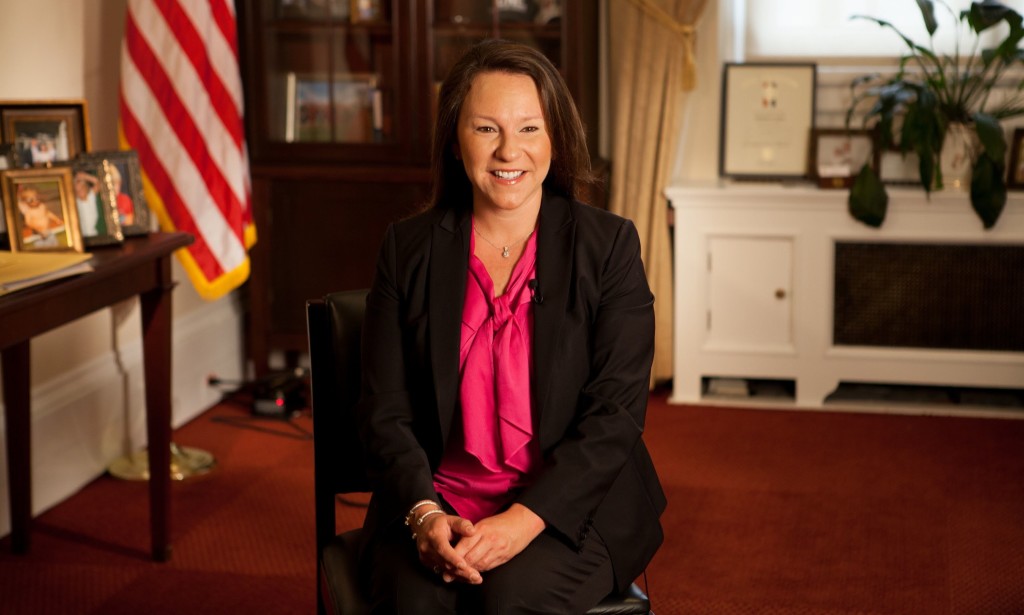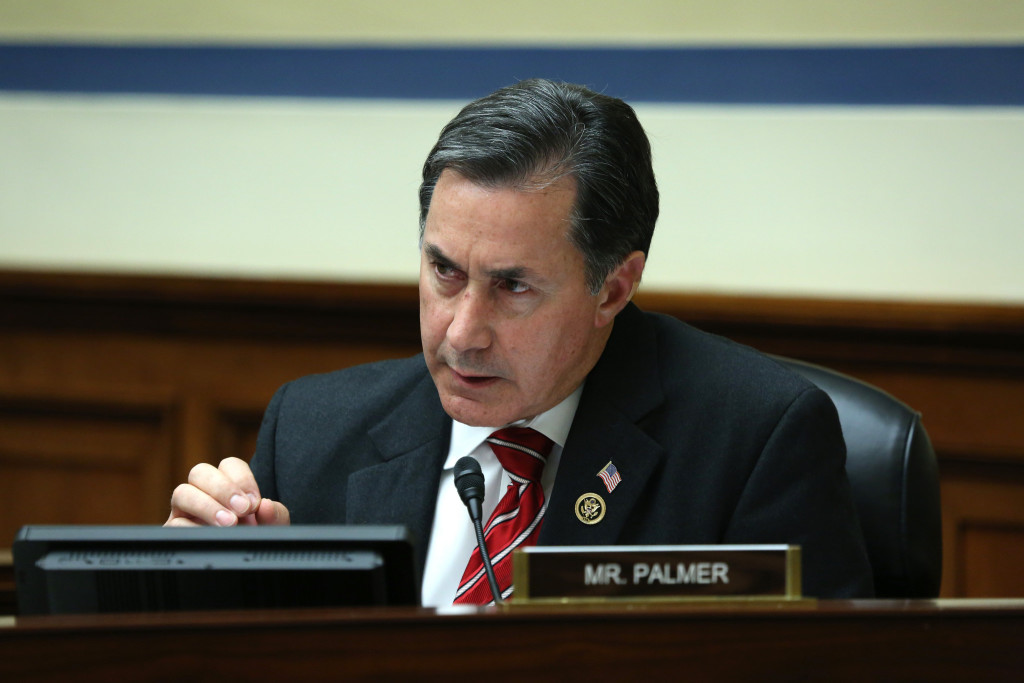This week in the U.S. House of Representatives: Jan. 11 – Jan. 15, 2016

While it may be a short legislative week, both the House and Senate will be in session starting Monday. There are two, big non-legislative events on the schedule this week: President Barack Obama will deliver his final State of the Union address Tuesday evening, and the Republican Conferences of both chambers leave Washington after voting Wednesday for their annual GOP retreat. Monday, the U.S. House of Representatives is in session and will consider several bills under Suspension of the Rules, including H.R. 757: which strengthens and expands existing sanctions against North Korea in the wake of its recent nuclear weapons test. A full list of bills can be found here. Other legislation up for consideration this week: H.R. 1644: the Supporting Transparent Regulatory and Environmental Actions in Mining (STREAM) Act. The bill prevents the Office of Surface Mining Reclamation and Enforcement (OSM) from issuing any final rules related to coal mining activities near streams, including updating a stream buffer zones (SBZ) rule, until after the National Academy of Sciences submits a study on the effectiveness of existing rules in effect — effectively delaying any new or revised SBZ rules for at least three years. Alabama co-sponsor(s): None. H.R. 3662: the Iran Terror Finance Transparency Act. The bill restricts the president’s ability to lift sanctions on Iranian and other financial institutions as called for by the Iran Nuclear agreement, by allowing sanctions to be lifted only the president certifies that the institutions have not knowingly helped fund Iran’s Islamic Revolutionary Guards, foreign terrorist organizations and other entities sanctioned in connection with Iran’s weapons of mass destruction or ballistic missile programs. Alabama co-sponsor(s): Rep. Bradley Byrne (AL-01); Rep. Gary Palmer (AL-06) S.J. Res. 22: a joint resolution to disapprove a EPA/Corps of Engineers rule governing Waters of the United States (WOTUS). The resolution disapproves of the rule issued by EPA and the Army Corps of Engineers on June 29, 2015, commonly known as the “waters of the United States” rule that seeks to clarify the federal government’s authority to regulate certain intrastate waters under the Clean Water Act, providing that the rule will have no force or effect. The Senate passed the resolution in November, acting under the Congressional Review Act. Alabama co-sponsor(s): Sen. Jeff Sessions; Sen. Richard Shelby Highlights of what is happening in House Committees this week: SBA Access to Capital: Tuesday, the House Small Business Committee will hold a hearing titled “SBA Management Review: Oversight of SBA’s Access to Capital Offices.” More information here. Iraq/Syria: Tuesday, the House Armed Services Committee will hold a hearing titled “Outside Views on the U.S. Strategy for Iraq and Syria and the Evolution of Islamic Extremism.” More information here. Veterans Backlog: Tuesday, the House Veterans’ Affairs Committee will hold a hearing titled “1988 to 2016: VETSNET to VBMS; Billions Spent, Backlog Grinds On.” More information here. Nuclear Energy: Tuesday, the House Science, Space and Technology Committee will hold a markup of H.R.4084: the “Nuclear Energy Innovation Capabilities Act.” More information here. Judiciary: Tuesday, the House Judiciary Committee will hold a markup of H.R.3406: the “Second Chance Reauthorization Act of 2015”; H.R.4240: the “No Fly for Foreign Fighters Act”; and H.R.1854: the “Comprehensive Justice and Mental Health Act of 2015.” More information here. Senate Schedule: S. 2232: the Federal Reserve Transparency Act. Deemed the “Audit the Fed” bill, the legislation would increase congressional oversight of the Federal Reserve and direct the Government Accountability Office to undertake a full audit of the Board of Governors of the Federal Reserve System and of the Federal Reserve Banks and report its findings to Congress. Alabama co-sponsor(s): None.
Alabama Republicans vote to repeal Obamacare, send bill to President’s desk

The Republican-led U.S. House of Representatives sent legislation to President Barack Obama Wednesday after voting to repeal his legacy health law in efforts to fulfill a 2014 promise to voters. H.R. 3762, the Restoring Americans’ Healthcare Freedom Reconciliation Act, which will almost certainly be vetoed, passed the House 240-181, with the support of all six Republicans of the Alabama Delegation. The bill would effectively demolish the President’s signature Obamacare law by repealing the individual and employer mandates, repealing the medical device and “Cadillac” tax. It also eliminates federal funding for Planned Parenthood, and reduces the deficit by over $500 billion. Here’s what the Alabama delegation had to say of their votes: U.S. Rep. Bradley Byrne (AL-01): The President can choose to stand with the American people or he can stand against the American people. If he chooses to veto the bill, then the American people will have seen a clear choice between two very different Americas: an America where the government knows best or an America where the hardworking people are empowered. Let’s make the President decide. Let’s hold him accountable. Let’s do the work of our constituents. And let’s pass this bill on behalf of every American who lost their health care plan or saw their health costs increase. Let’s do this for them. U.S. Rep. Martha Roby (AL-02): Yes, President Obama can stop our Obamacare repeal reconciliation package from becoming law this year. But, he cannot stop the growing chorus of Americans unhappy with the higher costs and broken promises of his healthcare law. Their voices are being heard in Congress, where, finally, a majority in both the House and Senate are ready to end this failed experiment and deliver better, more workable healthcare policy. U.S. Rep. Mike Rogers (AL-03): After voting to repeal Obamacare numerous times in the House without the legislation going anywhere in the Senate, I am thrilled that today this bill has passed both chambers and will finally go to President Obama’s desk. H.R. 3762 not only repeals Obamacare, it defunds Planned Parenthood and reduces Federal deficits by an estimated $78.1 billion by 2025. The American people have been very clear in their priorities that this flawed health care law just does not work for them, that Planned Parenthood must not be a wholesale provider of abortions and government spending must be kept in check. Now, President Obama will have the opportunity to make a choice, stand with the priorities of Americans or stand against them by vetoing the repeal bill. U.S. Rep. Robert Aderholt (AL-04): This is the first time since Obamacare was forced on the American people in 2010 that a bill which actually repeals Obamacare will land on the President’s desk. For the first time, the President will have to sign the bill or veto it – no hiding behind comments about Congress. In these six years it has become clear Obamacare is a failed law. How do we know it has failed? Just look to the millions of families across our country that are struggling each month to pay higher premiums with huge out of pocket expenses for less coverage. It is not enough to try to play defense against the President’s failed policies; instead we will roll up our sleeves to craft tough legislation and take the fight to the White House. We must take the fight to the President — as only Nick Saban can win playing defense all the time. U.S. Rep. Mo Brooks (AL-05) U.S. Rep. Gary Palmer (AL-06): The House has voted to repeal Obamacare before, but because of opposition by Senate Democrats, it has never gone further. Now, through the reconciliation process, both bodies voted to repeal major components of Obamacare and send it to President Obama’s desk. I have no illusions about whether the President will sign the bill. But by putting this in front of him, Congress has proven it has the will and the ability to repeal Obamacare, and put that choice before the American people when it comes time to elect a new President. U.S. Rep. Terri Sewell (AL-07): The Restoring Americans’ Healthcare Freedom Reconciliation Act is House Republicans’ 62nd attempt to undermine or repeal the Affordable Care Act (ACA). We cannot afford to waste time on a bill that is destined for a veto, particularly when there are much more pressing issues facing our great nation. This bill is designed to take health insurance from 22 million uninsured Americans. It would cut the subsidies provided to low and middle income Americans living with diabetes and other diseases. Among its most dangerous provisions is a measure to repeal the Medicaid expansion. Alabama has yet to expand its Medicaid program, and my constituents are among those who have been hardest hit by state lawmakers’ inactions.
House vote to send health law repeal to Barack Obama for first time

After dozens of failed attempts to undo President Barack Obama‘s health care law, the GOP-led Congress will finally put a bill on the president’s desk striking at the heart of his signature legislative achievement. Obama will veto the bill, and so the ultimate outcome will be the same as the many previous GOP attempts to repeal “Obamacare.” But Wednesday’s vote in the House will mark the first time such a bill makes it all the way to the White House. Unlike past efforts that were blocked by Senate Democrats, this time the legislation was written under special rules protecting it from a Democratic filibuster. It passed the Senate late last year, and so Wednesday’s House vote will send it straight to Obama. House GOP leaders, opening their 2016 legislative session, said Wednesday’s vote and Obama’s subsequent veto will lay bare a stark choice between the parties in a presidential election year. The legislation also cuts federal funding for Planned Parenthood. Democratic presidential front-runner Hillary Clinton has decried the legislation while leading GOP candidates applaud it. “It’s up to the president to decide if he wants to side with the people whose health care costs have skyrocketed out of control, or the abortion industrial complex whose profits have skyrocketed out of control,” said Speaker Paul Ryan, R-Wis. “Congress is holding President Obama accountable.” Democrats denounced the vote as a waste of time aimed at placating GOP base voters riled up by Donald Trump and the unruly Republican presidential race. “It’s the 62nd vote on repealing the Affordable Care Act. It has as much chance as the previous ones did,” said House Democratic Whip Steny Hoyer of Maryland. He said that Republicans “don’t have an alternative, and the reaction of the American public if they lost the benefits and protections of the Affordable Care Act would be very upset.” Indeed despite numerous promises to “repeal and replace” the health care law since its enactment nearly six years ago, Republicans have never coalesced around an alternative. Ryan has promised that will change this year. The bill being voted on Wednesday would dismantle the health law’s key pillars, including requirements that most people obtain coverage and larger employers offer it to workers. It would eliminate the expansion of Medicaid coverage to additional lower-income people and the government’s subsidies for many who buy policies on newly created insurance marketplaces. And it would end taxes the law imposed to cover its costs. The bill would also terminate about $450 million yearly in federal dollars that go to Planned Parenthood, about a third of its budget. A perennial target of conservatives, the group came under intensified GOP pressure last year over providing fetal tissue for research. “It is appalling that in their first week back in session the top priority for Republican leaders in the House is rolling back women’s access to preventive health care,” said Dawn Laguens, vice president of the Planned Parenthood Action Fund. GOP leaders hope to schedule a veto override vote to coincide with the Jan. 22 March for Life in Washington, the annual gathering of anti-abortion activists on the anniversary of the 1973 Supreme Court decision that legalized abortion. However Republicans do not command enough votes to override the president’s veto. Republished with permission of the Associated Press.
Meet the Alabama Members of Congress who pack heat

Alabama’s own Rep. Mo Brooks (AL-05) and Rep. Gary Palmer (AL-06) practice what they preach when it comes to the Second Amendment: Not only do they support it with their votes in Congress, but they also pack heat. According to the Daily Caller, Brooks and Palmer are among 17 Members of the U.S. House of Representatives‘ House Freedom Caucus who say they currently carry, or did as of 2013. “I do have a concealed carry permit, as does my wife,” Brooks told The Daily Caller News Foundation (TheDCNF). “There’s terrorism and there’s crime,” Brooks said. “You never know when either one is going to happen. You can rely on terrorists and criminals not to hurt you, or you can prepare yourself so they don’t hurt you. I trust myself more than the terrorist.” When TheDCNF asked Palmer if he owns a gun, he told them asking if he owns a gun is the wrong question. “The question should be, how many?” Palmer said. The members of the House Freedom Caucus — arguably the most pro-Second Amendment caucus in Congress — could soon be gearing up for an epic battle over the Second Amendment as President Barack Obama Tuesday announced “a series of common-sense executive actions” to reduce gun violence, which Palmer says are “beyond the scope of his Constitutional powers.” Here are the members of the House Freedom Caucus who say they currently carry, or did as of 2013 (all are Republicans): Alabama Rep. Gary Palmer Alabama Rep. Mo Brooks Arizona Rep. Paul Gosar Arizona Rep. Matt Salmon Arizona Rep. David Schweikert Arizona Rep. Trent Franks Colorado Rep. Ken Buck Florida Rep. Ted Yoho Florida Rep. Bill Posey Indiana Rep. Marlin Stutzman Louisiana Rep. John Fleming Ohio Rep. Jim Jordan South Carolina Rep. Jeff Duncan South Carolina Rep. Mick Mulvaney Tennessee Rep. Scott Desjarlais Texas Rep. Randy Weber Virginia Rep. Dave Brat According to a 2013 USA Today survey of gun-owners in Congress, Alabama Reps. Martha Roby (AL-03) and Mike Rogers (AL-03) also own guns, but are not members of the House Freedom Caucus.
This week in the U.S. House of Representatives: Jan. 4 – Jan. 8, 2016

U.S. House lawmakers are back in Washington, D.C., this week to kick-off the second session of the 114th Congress. This week the GOP-led Congress will make good on a 2010 promise: voting to repeal and replace Obamacare. The House is expected to vote to concur in the Senate Amendment to H.R. 3762: the Restoring Americans’ Healthcare Freedom Reconciliation Act. This reconciliation bill was previously considered in the House and later the Senate, where it was amended slightly requiring this return to the House for what is likely final consideration. The bill repeals or significantly modifies numerous major provisions of Obamacare, including repeals of the individual and employer mandates, tax subsidies for individuals to purchase health insurance from exchanges, the expansion of Medicaid, and the Prevention and Public Health Fund. It also effectively eliminates more than a dozen taxes included in the law, including the medical device tax, the “Cadillac” tax, the net investment tax, and the additional Medicare tax. Finally the bill blocks federal funding for Planned Parenthood for one year and provides alternative women’s health funding for community health centers. House passage of the measure would clear it for President Barack Obama who has said he will veto it Alabama co-sponsor(s): N/A Additional legislation on the floor of the U.S. House of Representatives this week: H.R. 1155: the Searching for and Cutting Regulations That Are Unnecessarily Burdensome (SCRUB) Act. The bill establishes a nine-member commission to review existing federal regulations and identify those that should be repealed in order to reduce costs on the U.S. economy. Alabama co-sponsor(s): N/A H.R. 712: the Sunshine for Regulatory Decrees and Settlements Act. The bill requires the federal government to provide advance public notice when it plans to enter into discussions regarding consent decree or settlement agreement, allowing affected third parties to intervene in that process. It also requires federal agencies to file monthly status reports of their rule-making activities and requires that a 100-word summary of each proposed rule be posted online, along with the proposed rule itself. Alabama co-sponsor(s): N/A H.R. 1927: the Fairness in Class Action Litigation and Furthering Asbestos Claim Transparency Act. The bill prohibits federal courts from certifying proposed classes of individuals for a class action lawsuit unless each member of the class has suffered the same type and degree of injury, and it requires quarterly reports by asbestos trusts of claims made against the trusts and any payouts made by the trusts for asbestos-related injuries. Alabama co-sponsor(s): N/A
Martha Roby: Marking successes in 2015, renewing priorities for 2016

As 2015 comes to a close, it offers us a chance to reflect on the work the past year and gain a sense of renewed priorities for the year to come. Legislative achievements can be scarce in the halls of Congress, but this year actually saw several successes on issues important to Alabama. Empowering States in Education Decisions: In a huge win for states’ authority in education, a bill to finally replace the flawed “No Child Left Behind” policy was passed by the House and Senate and signed into law. The strong “state authority” provisions I introduced and championed were included in the final bill and are now law. These provisions strictly prohibit the federal government from using funding grants or rule waivers to coerce states into adopting its preferred policies, like Common Core. Funding Our Nation’s Infrastructure: For the first time in a decade, we were able to get a long-term highway bill passed and signed into law. The legislation provides for our nation’s infrastructure for five years while deferring much of the planning and decision-making to states and local governments. It’s Congress’ responsibility to fund transportation infrastructure and make sure the tax dollars you send to Washington come back to benefit you, so I was pleased to get this bill done. Bolstering National Security: Amid the terrorist threat, Congress took an important step to strengthen security protocols in our visa program. The Visa Waiver Program Improvement and Terrorist Travel Prevention Act closes gaps in our system to prevent terrorists from exploiting our relationships with other nations to gain entry into the United States. This is just one of many steps we need to take to beef up security and make sure authorities have the tools they need to protect Americans here at home. On several other important issues, we made progress but fell short of getting legislation passed. Among them: Halting EPA Overreach: The House voted to put a stop to the Environmental Protection Agency’s aggressive attempt to expand its reach into private lands by seeking to make small ponds, puddles and ditches subject to strict federal regulations. Our bill still awaits Senate action, but, thankfully, the Judicial Branch stepped in to halt this action as it is reviewed for constitutionality. Defunding Planned Parenthood: I have fought to stop taxpayer dollars from going to the nation’s largest abortion provider since I first came to Congress, and this year I was the last one standing in a “last ditch” effort to cut off these dollars in a government funding bill. In the end, the Senate blocked our efforts. But, I believe highlighting the issue and not allowing the media to ignore it were important. Public funds are much better spent at Federally Qualified and Rural Health Centers that provide an array of services for low income women but do not perform abortions, and I’ll keep working to make that so. In the coming year, I’ll continue fighting to advance conservative legislation that puts the priorities of Alabamians first. Martha Roby represents Alabama’s 2nd Congressional District. She lives in Montgomery with her husband, Riley and their two children.
Alabama delegation votes on $1.1 trillion Omnibus bill

The U.S. House of Representatives approved a $1.1 trillion spending bill by an overwhelming 316-113 vote Friday morning, wrapping up a frenzied month of legislating just in time for the lawmakers to head home for the holidays. The so-called Omnibus bill — a massive year-end spending bill that incorporates legislation from the 12 appropriations subcommittees as well as reforms to the Visa Waiver program and lifting a ban on U.S. oil exports — funds the federal government through September 2016. The bill now heads over to the U.S. Senate where it is expected to clear the chamber later Friday without the support of Alabama Sens. Richard Shelby or Jeff Sessions. Rep. Robert Aderholt (AL-04) was the sole Alabama Republican to vote for the bill. He joined 149 of his GOP peers in supporting the measure, along with 95 Democrats including Alabama’s lone Democrat, Rep. Terri Sewell (AL-07). The remainder of the seven-member delegation — Reps. Bradley Bryne, Martha Roby, Mike Rogers and Gary Palmer — voted against the bill. Here’s what delegation members are saying about their votes: U.S. Rep. Bradley Byrne (AL-01): Our nation is at war, and I could not support a government funding bill that fails to address the reality of the serious security challenges our nation is facing. I was disappointed the bill did not include provisions to block any funding from going to the Syrian refugee resettlement program. For months now, I have been warning about the legitimate problems posed by this program, and this bill fails to prevent the President from bringing Syrian refugees into the United States. Statement from U.S. Rep. Martha Roby‘s (AL-02) Communications Director Todd Stacy: Representative Roby takes her role on the Appropriations Committee seriously. For the last year she fought to craft conservative spending policies that kept faith with our priorities and values. Unfortunately, this Omnibus bill abandoned that work and did not reflect the conservative principles she has fought for, so she voted against it. U.S. Rep. Mike Rogers (AL-03): I am outraged that the bill that passed today did not prohibit funding for President Obama to bring refugees from the Syrian conflict to America. What happened in California demonstrates that Islamic terrorists are ready and willing to use our lax immigration system to enter our country to do us harm. Now, President Obama will be able to carry out his plan to let thousands of refugees from the Syrian conflict into the U.S. I have no confidence that these refugees can be properly vetted by this Administration. President Obama’s plan is dangerous and I will continue to fight against it. U.S. Rep. Robert Aderholt (AL-04): U.S. Rep. Mo Brooks (AL-05) Thursday prior to his Friday vote: Tomorrow, Congress will once again be forced to vote on a hastily thrown together $1.1 trillion omnibus spending bill that is 2,009 pages long, that very few Senators and Congressmen have had the time to read much less fully understand, that no one was allowed to amend on the House floor, and that further undermines America’s solvency. While I am thankful the omnibus bill increases funding for NASA’s Space Launch System and America’s national security, empowers Decatur’s United Launch Alliance to compete for critical defense space payloads, and reduces burdensome regulations on America’s farmers, these and other positive things could and should be done without increasing the risk of a debilitating American insolvency and bankruptcy, without using taxpayer money to empower President Obama to pay illegal aliens to break our laws and come to America, without increasing terrorism risks by paying Syrians to come to America, without forcing American taxpayers to pay for other peoples’ abortions, and without permitting President Obama to quadruple H-2B visas so that more foreign workers can take jobs from and undermine the wages of struggling American families. Rather than instituting a deliberate, long-term budgeting process that provides certainty for job creators and minimizes America’s risk of a debilitating insolvency and bankruptcy, this omnibus bill makes matters decidedly worse. The dramatic expense, compounded by the increased security and terrorism risks forced on American citizens, is unconscionable. That is why I am voting “No” on this misguided legislation. U.S. Rep. Gary Palmer (AL-06): A spending bill should reflect the priorities of our nation. This $1.1 trillion bill does not. It continues to pile debt on our children without sufficient reforms. Furthermore, it fails to include numerous policy priorities that should have been included. Recently, a veto-proof majority of the House passed legislation to strengthen the vetting of Syrian refugees. This reform should have been included in this bill, but was not. This bill also allows funds to continue to flow to Planned Parenthood and does nothing to defund Obama’s unlawful administrative amnesty. The bill does have a few good provisions, like lifting the ban on crude oil exports, which I have long supported. Unfortunately even this significant victory is overcome by the numerous deficiencies. The process to get to this point was no better than the underlying legislation it produced. I hope that going forward, the process will be different. U.S. Rep. Terri Sewell (AL-07): My vote was cast in favor of keeping the government operating and to continue to make critical investments agency programs that benefit all Americans. I also firmly believe that we cannot afford another shutdown and this bill provides the Federal Government with funding through September 30, 2016. The omnibus provides much needed increases for a broad range of education programs including Head Start, Title I grants, aid to HBCUs, the TRIO and GEAR UP programs, and rural education. Providing the resources low-income families need to increase their academic success is one of my highest priorities, and this legislation is a first step in the right direction. This is not a perfect bill, but I am proud that both sides of the aisle were able to work out a compromise that benefits our nation, and helps us continue to grow.
White House, congressional negotiators near agreement on spending, tax cut deal

White House and congressional negotiators moved toward clinching a tax and spending compromise that would cap Congress’ year by extending numerous tax credits and financing government agencies in 2016. Eleventh-hour differences remained over Republican efforts to lift a ban on U.S. oil exports. House Speaker Paul Ryan said Tuesday morning that the deal would be released later in the day and come to a vote on Thursday. That would require passage of another short-term spending bill since government funding expires Wednesday at midnight. “I’m not going to predict how the vote count is going to go down. Look, in negotiations like this you win some, you lose some. Democrats won some, they lost some. We won some, we lost some,” Ryan, R-Wis., said at a breakfast hosted by Politico. “At the end of the day we’re going to get this done.” But on the Senate floor, Minority Leader Harry Reid, D-Nev., said Democrats would not relent on demands that in exchange for allowing American crude oil exports for the first time in four decades, his party wanted provisions aimed at encouraging alternative energy development and protecting Obama administration efforts to reduce greenhouse gas emissions. “If Republicans think reducing our carbon emissions and encouraging use of alternative energy is an unacceptable price to pay, we can move the rest of the package” without lifting the oil export ban, Reid said. He added, “It’s decision time.” Appearing with Ryan, Senate Majority Leader Mitch McConnell, R-Ky., avoided offering details but spoke of the benefits of a long-term deal to extend dozens of tax breaks sought by lawmakers on both sides. McConnell said such a deal would make a larger tax reform package easier to achieve next year, while satisfying business goals, including extending a research and development tax credit and a popular deduction for equipment purchases. “Making those permanent is, I think, an important shot in the arm to our economy,” McConnell said. A major priority for the GOP and some Democrats was lifting the 40-year-old bar against exporting U.S. crude oil, a remnant of the 1970s oil shortages that industry supporters consider unneeded with today’s explosion of domestic oil extraction. Critics say ending the prohibition would be a windfall to big oil companies that would damage the environment by encouraging more drilling. In exchange, Democrats were seeking concessions including renewing tax breaks for solar and wind energy producers for five years and reviving an environmental conservation fund. Democrats also wanted to block GOP efforts to roll back Obama administration environmental regulations, including one setting new emission standards for power generating plants. Negotiators had sorted through remaining disputes over environment, labor and other provisions in a $1.1 trillion bill financing federal agencies for 2016. The final package is expected to ignore conservative demands for language clamping down on Syrian refugees entering the U.S. Instead it would contain changes to the “visa waiver” program that allows visa-free travel to the U.S. for citizens of 38 countries, including France and Belgium, where many of the Paris attackers were from. Lobbyists said the spending package would likely lack a provision pushed by House Minority Leader Nancy Pelosi, D-Calif., easing curbs against gun violence research by the federal Centers for Disease Control and Prevention. Also in play were about 50 lapsed and expiring business and individual tax breaks that the two sides were looking to extend, in some cases permanently. The price tag of the overall package was unclear but it could mushroom to several hundred billion dollars over a decade, which would further add to federal deficits. “If I can play it right, both sides should walk out of here feeling pretty good,” said Sen. Orrin Hatch, R-Utah, chairman of the tax-writing Senate Finance Committee. Lobbyists said bargainers had tentatively agreed to postpone the launch of a tax on high-value health insurance plans from 2018 to 2020. There may also be a two-year pause in the existing 2.3 percent medical device tax and a one-year suspension of a levy currently imposed on health insurers, which the companies generally pass on to customers as higher premiums. Those three taxes were boosted as part of President Barack Obama‘s 2010 health care overhaul to pay for the law’s expanded coverage for millions of people. The administration has long resisted unraveling that statute, but there is strong bipartisan support in Congress for easing those taxes. The two sides also were working to make some expiring business tax credits permanent in exchange for doing the same to tax breaks for children, college students and lower-earning families. Republished with permission of the Associated Press.
U.S. Reps. Terri Sewell, Ed Royce push to remove barriers to homeownership

Alabama U.S. Rep. Terri Sewell (AL-07) reached across the aisle Thursday to California U.S. Rep. Ed Royce (CA-40) in efforts to remove barriers to homeownership. The two – both members of the House Financial Services Committee – introduced, H.R. 4211, the Credit Score Competition Act of 2015, which allows the Government-Sponsored Enterprises (GSE) Fannie Mae and Freddie Mac to consider alternate credit scoring models when making mortgage lending decisions. “Fannie Mae and Freddie Mac are the largest mortgage purchasers in the nation, but they rely on credit score models that don’t necessarily take into account something as simple as whether borrowers have paid their rent on time,” Sewell said. “Home ownership is an integral part of the American Dream that shouldn’t be out of the reach for low-income, rural, and minority borrowers who lack access to traditional forms of credit. This legislation takes an important step towards addressing this issue and helps make homeownership a reality for more Americans across the country.” Fannie Mae and Freddie Mac currently evaluate their ability to purchase a mortgage based exclusively on a consumer’s FICO credit score. FICO scores are based on models and data from 1995 to 2000 that unnecessarily excludes millions of qualified borrowers. “The Credit Score Competition Act of 2015 allows Fannie Mae and Freddie Mac to consider modern and updated credit scoring models that give more creditworthy buyers access to affordable, home mortgages,” Sewell said. “It is my hope that this critically important legislation will help make homeownership a reality for many of the hard-working men and women living in Alabama’s 7th Congressional District.” The legislation will act to establish and preserve a competitive credit scoring marketplace by eliminating the Fannie and Freddie FICO monopoly and will foster innovation in the field and more affordable credit score products for consumers. “Breaking up the credit score monopoly at Fannie and Freddie will assist them in managing their credit risk and avoiding the need for another taxpayer bailout,” Royce said. “The GSEs’ use of a single credit score stifles innovation and affordability in the credit scoring field and bars millions of qualified homebuyers from purchasing a home.”
Alabama education advocates applaud passage of Every Student Succeeds Act

Wednesday, the U.S. Senate approved the Every Student Succeeds Act (ESSA), 85 to 12. Designed to update America’s public school system, the bill has now been sent to President Barack Obama for a signature. Education advocates say the new legislation, which replaces No Child Left Behind, gives states more control. Alabama GRIT – a statewide coalition of parents, teachers, military personnel, business leaders and civic organizations that advocates for high expectations in Alabama schools – agrees and supported the law’s passage. “For years, the democratically-elected Alabama State Board of Education’s efforts to raise academic expectations in our schools have been hampered by misconceptions about the federal government’s role in Alabama’s adoption of our College and Career Ready Standards, which were based on the Common Core State Standards,” said Caroline Novak, chair of Alabama GRIT and president of A+ Education Partnership. “This bill should put to rest any concerns Alabamians hold about who determines what is learned in Alabama’s classrooms,” Novak continued. “We hope that statewide conversations moving forward will now focus on what we can do together to provide students and teachers what they need to be successful.” Last week, the U.S. House of Representatives approved the same bill by a vote of 359 to 64. Among other provisions, this legislation restores control of education to state and local school boards by: Prohibiting any federal government entity from coercing or incentivizing states into adopting standards such as Common Core or specific assessments; Ending the U.S. Secretary of Education’s ability to influence state education policies through executive fiat and conditional waivers; Prohibiting the U.S. Department of Education from imposing any additional mandates on states and school districts in the areas of standards, assessments and state accountability plans, beyond what is specified in the legislation; and, Codifying that adoption of standards and assessments are solely the prerogative and responsibility of the states and not the federal government. “As we move forward, we are hopeful that we can now focus on what is taking place inside Alabama’s classroom instead of politics and misperceptions,” said Jessica Hammonds, executive director of Alabama GRIT. “By reducing the role of the federal government in education in Alabama, our state and local boards of education can create clearer paths to help every child in Alabama reach his or her full potential in life, whether they continue on to college or directly enter the workforce after high school.” The Alabama delegation, in both chambers, were split on the vote. Sen. Jeff Sessions (R-AL), Rep. Bradley Byrne (AL-01), Rep. Martha Roby (AL-02), Rep. Robert Aderholt (AL-04), Rep. Terri Sewell (AL-07) all voted in support of ESSA. Sen. Richard Shelby (R-AL), Rep. Mike Rogers (AL-03), Rep. Mo Brooks (AL-05), Rep. Gary Palmer (AL-06) all voted against it.
Martha Roby, Richard Shelby take opposing views on education reform bill

Last week, with Rep. Martha Roby‘s (AL-02) support, the U.S. House of Representatives overwhelmingly voted to scale back the federal government’s role in American education by passing the Every Student Succeeds Act. The bill, approved 359-64, replaces the 2002 No Child Left Behind law and hands over much of the decision-making power back to states and school districts across the country, while simultaneously ending federal efforts to encourage academic standards such as Common Core guidelines. The legislation would however retain the testing requirements, which many parents, teachers and school districts detest. Though it reforms the process and now grants the states the decision-making power over how to use the test results in assessing teachers and schools. “This is a big win for parents, teachers, administrators and anyone who has been frustrated by the federal intrusion in education policy,” explained Roby. “It isn’t just important for the current issues we know about. It’s also important for the next pet policy the Secretary of Education favors. Maybe that’s next year or five years from now, but I want to take away their ability to improperly coerce states once and for all, and that’s what my language does.” But not all Alabama lawmakers share Roby’s positive thoughts of the legislation. While U.S. Senator Richard Shelby (R-AL) took a stand against the legislation prior to the U.S. Senate‘s Wednesday vote. “While this bill may be well-intentioned and makes some improvements to our current policy, it is a missed opportunity to truly put an end to unnecessary federal intervention into education,” said Richard Shelby. “I have always believed that education decisions should be made at a local level and that Congress should empower parents and teachers – not Washington bureaucrats. Instead, this bill extends some of the same failed policies that could provide a path for top-down federal mandates like Common Core.” Shelby isn’t the only one who disapproves of the pending legislation. Roby’s primary challenger, Wetumpka Tea Party President Becky Gerritson calls Roby’s support of the bill a “headscratcher.” “[Roby’s] vote yesterday is yet another example of her support for Common Core, for top-down one-size-fits-all standards, for psychological profiling of our young students, and for the federal government dictating what goes on in our classroom,” Gerritson said in an email to her supporters. “I don’t know if Martha Roby agreed with every portion of this bill or if she was just doing what she was told by fellow members of the Establishment. What I do know is that this is yet another example of Martha leaving the values of the Second District at home. When Martha Roby goes to DC, her every action supports making government bigger, more unconstitutional, and more intrusive.” But not everyone in the 2nd Congressional District shares Gerritson’s concerns. Roby put out a press release Wednesday citing the support and approval of several district educators, including Dothan City Schools Superintendent Chuck Ledbetter, Ed. D. “While it isn’t perfect, it is does return more of the education policy making role to the states and local school boards,” assures Ledbetter. “It continues to emphasize education equity for all students while giving back control of how equity and excellence are achieved to those closer to the students who can make better, individualized decisions to help students learn. We appreciate Rep. Roby’s help in curtailing federal overreach and her willingness to support this important education bill.” The Senate approved the legislation Wednesday, 85-12 with the support of Sen. Jeff Sessions (R-AL), and it is now on its way to President Barack Obama‘s desk to be signed into law.
Gary Palmer stands up for coal miners in committee hearing

Congressman Gary Palmer (AL-06), a member of the Oversight and Government Reform Subcommittee on Interior, attended a hearing Tuesday on the Department of the Interior’s (DOI) recently proposed Stream Protection Rule and took a stand against it citing how it would affect Alabama coal miners. Palmer claims the rule, which regulates surface coal mining operations in and near streams, would have significant negative effects on energy production. “Coal Miners are not made-up stats, they are real people,” Palmer said. “The DOI needs to come to Alabama and talk to some of the coal mining families, particularly the kids, who are facing the prospect of Christmas with no presents; or young people who are withdrawing from college. Instead, the Department of the Interior has frozen out states and industry in the rule-making process.” The original version of the rule, passed in 1979, created a buffer zone around year-round streams near mining operations. According to Palmer, the new, more stringent rule would have significant negative economic effects. Estimates say it could cost up to 280,000 Americans their jobs. You can watch Congressman Palmer’s questions at the hearing below:


